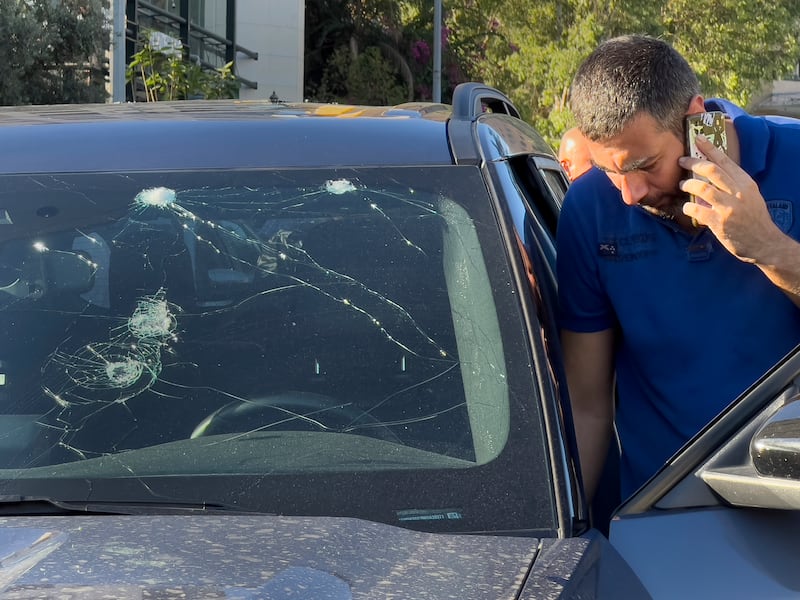At least nine people were killed, and 2,750 wounded, many seriously, on Tuesday afternoon, when pagers carried by Hizbullah militants exploded across Lebanon and Syria.
The explosions occurred simultaneously at 3.30pm local time, concentrated in Hizbullah strongholds such as Beirut’s southern Dahiyeh neighbourhood, and also in Syria, with explosions reported in Damascus and elsewhere. Some of the injured were senior Hizbullah commanders and Iran’s ambassador to Lebanon, Mojtaba Amani, was also lightly hurt, along with two of his bodyguards.
Video footage showed explosions taking place on streets, in markets and inside shops with scores of ambulances, sirens blaring, arriving at local hospitals, which were soon overwhelmed.
Lebanon’s health minister told Reuters that some 400 people were in critical condition, mainly with head, arm and stomach injuries. Lebanese residents were urged to avoid approach roads to hospitals and to donate blood.
READ MORE
Sky News Arabia reported that Mossad, the Israeli national intelligence agency, got hold of the pagers before they were recently delivered to the militants and placed a quantity of PETN, a highly explosive material, on the batteries of the devices, and detonated them by remotely raising the temperature of the batteries.
Both the Lebanese government and Hizbullah blamed Israel. A Hizbullah statement vowed retribution for the “criminal aggression that also targeted civilians”. The Iranian-backed group vowed that its response will come “from where the enemy expects it and from where it does not expect it”.
There was no comment from Israel and ministers were instructed not to speak to the media or give interviews.
[ Exploding pagers join long history of killer communications devicesOpens in new window ]

Tuesday’s attack marked an unprecedented security breach for Hizbullah and the most significant blow suffered by the militant Shia group since it was founded in 1982. A response is inevitable although the timing and scope remain unclear. The nature of the response has the potential to plunge the entire region into war.
The attack came only hours after Israel’s security cabinet updated the objectives of the 11-month war, focused on Gaza, to include restoring 63,000 residents of northern Israel safely back to their homes. That decision came hours after US envoy Amos Hochstein urged Israeli leaders against escalating the conflict with Hizbullah, warning of potentially disastrous consequences.
Hizbullah, which possess an arsenal of more than 100,000 rockets, has been engaged in steadily escalating cross-border fire with Israel since October 8th, the day after the start of the Gaza war. Hizbullah leader Sheikh Nasrallah Nasrallah, who was not hurt in Tuesday’s attack, has vowed that the attacks will continue as long as there is fighting in Gaza.
Israeli leaders have made it clear over recent weeks, with Gaza ceasefire efforts deadlocked, that war against Hizbullah is a distinct possibility in order to remove the threat to its northern border.
Hizbullah operatives were issued pagers, believing they were more secure than mobile phones. Messages to the Hizbullah operatives were sent simultaneously on Tuesday, just seconds before the explosions, explaining why so many of the reported injuries were hand or head injuries.
In response to the attacks, all Lebanese medical staff were asked to report to their respective hospitals to help treat the wounded, and were told not use pagers. Classes at Lebanese universities and schools were cancelled on Wednesday.
Just before Tuesday’s attacks, the Israel security agency Shin Bet said they had foiled a recent attempt by Hizbullah to assassinate a former senior Israeli security official using a remotely detonated bomb that would have been carried out in the coming days. The device included a camera and a cellular connection, which would have allowed Hizbullah to activate it from Lebanon.
- Sign up for push alerts and have the best news, analysis and comment delivered directly to your phone
- Join The Irish Times on WhatsApp and stay up to date
- Listen to our Inside Politics podcast for the best political chat and analysis















